Under global scrutiny, Turkey vows to get to the bottom of the alleged killing of a Saudi journalist at the kingdom's consulate in Istanbul. But some observers see a double standard in promises of transparency from a government accused of stifling freedom of expression.
Since an attempted coup in 2016, critics say President Recep Tayyip Erdogan has turned Turkey into an increasingly authoritarian state, using emergency powers to arrest tens of thousands of suspects, purging many more from state institutions and jailing dozens of journalists. Officials have even admitted that they seized dozens of Turks in anti-terror operations in other countries.
Turkey says the government is dealing with multiple threats to its security and sovereignty in a volatile region, and denies allegations it used the crackdown to target legitimate opposition and silence critical media that had nothing to do with the failed coup.

Turkey's President Recep Tayyip Erdogan addresses supporters in Kayseri, Turkey, Saturday, Oct. 13, 2018.(Presidential Press Service via AP, Pool)
While there might be parallels between some restrictions on freedoms in Turkey and Saudi Arabia, the Turkish reports about Jamal Khashoggi, a columnist for The Washington Post, are horrifically unprecedented.
The reports say an official hit squad from Saudi Arabia killed the writer, who once wrote of the persecution of people who "dare to speak their minds" in his home country. Saudi Arabia denies it, though some U.S. media reports suggest Saudi Arabia might say Khashoggi was killed in a botched interrogation.
Turkey has followed the law and international agreements and taken "open and transparent actions" in the Khashoggi case, Interior Minister Suleyman Soylu told the state-run Anadolu news agency.
Getting less international attention this week were Turkish media reports that an Istanbul court issued a "red notice" for journalists Can Dundar, who lives in Germany, and U.S.-based Ilhan Tanir on espionage charges.
A red notice serves as a request to member countries of Interpol to arrest a suspect, though Western concerns about freedom of expression in Turkey would likely slow the government's international pursuit of the pair. Dundar was the former chief editor of Cumhuriyet, an anti-government newspaper, and had previously been jailed in Turkey for reports that were deemed subversive.
Dundar has tweeted about Turkey's handling of the Khashoggi investigation, asking why the Saudi consul general was allowed to leave Turkey despite a Turkish media report that a purported audio recording of the alleged slaying indicates the diplomat was a witness. Saudi officials have not responded to repeated requests for comment from The Associated Press.
Ahval, an online news site that is banned in Turkey, this week posted an article with the headline: "The irony of Turkey's campaign for a missing Saudi journalist."
In 2017, the Committee to Protect Journalists said Turkey was the "the world's worst jailer" of journalists, with 73 behind bars. This month, the Turkish Journalists Syndicate estimated that number to be 144. Turkey claims many people identified as journalists are actually agents of outlawed organizations, including that of Fethullah Gulen, a U.S.-based Muslim cleric who denies Turkish allegations that he engineered the 2016 coup attempt.
But in an unusual admission, Deputy Prime Minister Bekir Bozdag said in a television interview in April that Turkey's intelligence agency, in operations in 18 countries, had "bundled up and brought back" at least 80 Turkish nationals wanted for alleged links to the coup attempt.
Bozdag's comments came after Turkey secretly arranged the deportation from Kosovo of six Turkish men, sparking the dismissal of Kosovo's interior minister and intelligence chief and criticism from human rights groups. In another case, three men accused of ties to Gulen were seized in Gabon and brought to Turkey for trial, state-run media reported.
American pastor Andrew Brunson was one of the most high-profile detainees in the government crackdown, spending nearly two years in detention until a Turkish court last week convicted him on terror-related charges — and then freed him. The release removed a major irritant in U.S.-Turkish ties and highlighted concerns that Turkey had been trying to use the U.S. citizen as diplomatic leverage, though Erdogan said it actually proved that Turkey's courts are impartial. Turkey also jailed Turkish-American citizen Serkan Golge, a NASA employee, and detained several Turkish employees of the U.S. diplomatic mission.
Separately, Human Rights Watch said Wednesday that it welcomed Erdogan's decision to drop a complaint against four students who faced trial for the Turkish crime of insulting the president. But it said there are thousands of similar cases in the courts that "blatantly violate freedom of expression."
Meanwhile, Turkey's judicial system is moving slowly in the case of Osman Kavala, a Turkish businessman and activist who was arrested a year ago on allegations similar to those in the Brunson case. No indictment has been issued.
"I am waiting for the day when I will be able to defend myself in court and see the face of justice," Kavala wrote from prison in August.
PARIS (AP) — French President Emmanuel Macron warned Thursday that Europe could “die” if it fails to build its own robust defense as Russia’s war in Ukraine rages on, or if it fails to undertake major trade and economic reforms to compete with China and the U.S.
Macron urged Europeans to become more ambitious in a fast-changing world to face the challenges of war, fierce trade competition, energy scarcity, climate change and increasing authoritarianism.
In a nearly two-hour speech at Sorbonne University in Paris, Macron said that the continent is divided and “too slow and lacks ambition” at a time when the 27-member European Union needs to become a superpower, defend its own borders and speak with one voice if it wants to survive and thrive.
“Our Europe today is mortal,” Macron said. “It can die and that depends solely on our choices,” he added. He called on people to make those choices now because, “it’s today that Europe is between war and peace.”
Russia's full-scale invasion of Ukraine, now in its third year, is an existential threat and Europe isn't armed enough to defend itself when “confronted by a power like Russia that has no inhibitions, no limits,” Macron said.
‘Our ability to ensure our security is at stake," Macron said. “Russia mustn’t be allowed to win.”
Europe now has the “good fortune” of having the Biden administration’s commitment to supporting Ukraine, Macron said. But, in a year of key elections around Europe, in the U.S. and elsewhere, support may fragment or disappear entirely, he added.
“Europe must become capable of defending its interests, with its allies by our side whenever they are willing, and alone if necessary,” Macron said.
Strong armies, a European rapid intervention program and force, tanks, a missile shield and other weapons, produced in Europe, will need the support of “a joint diplomatic force that will speak with one voice and build bridges with Africa and Latin America,” the French leader said.
“Only then will Europe show that it's not a United States’ lap dog, and that it also knows how to talk to other regions of the world,” he said.
France has been a firm supporter of Ukraine in its fight against Russian aggression, and Macron has often clashed with other Western leaders as he has insisted that Europe must stand by the country at any cost. The French president alarmed European leaders by saying recently that sending Western troops into Ukraine to shore up its defenses shouldn’t be ruled out.
Referring to trade practices of China and the U.S., Macron said “the two world powers have decided not to respect the rules of global trade” by shoring up protections and subsides while Europe’s industry remains open and is stuck in overregulation.
“Let’s do the same, we are in competition,” Macron said.
“We must buy faster, we must produce more and we must buy more that is made in Europe. That is key,” Macron said.
Thursday's speech came less than two months before a pivotal European Parliament election.
Macron, an avid advocate of a united and assertive Europe, also rallied support for his centrist Renaissance party before the June 6-9 vote as far-right parties lead the moderate coalitions in the polls. He called for safeguarding democratic values as the “authoritarian model” was becoming “more popular” across the continent.
The war in Ukraine and immigration are top priorities for European Union voters, according to polls. Far-right parties have gained support by criticizing Macron’s government policies on both issues. Macron acknowledged divisions on immigration policies, including on asylum and deportation rules for those who have arrived to Europe illegally.
He emphasized the need for an effective response and Europe-wide coordination for curbing illegal immigration, closer cooperation with immigrants' countries of origin and a unified, relentless fight against human traffickers.
Macron criticized the idea of striking an agreement, as Britain as done, with countries in Africa and elsewhere to transfer immigrants there.
“This is a betrayal of our values that ultimately leads us to dependency on other counties,” Macron said.
The British government earlier this week approved a law allowing the deportation of some migrants who enter the country illegally to Rwanda.
Macron lost his majority in France’s most influential house of parliament, the National Assembly, after the 2022 election to the far-left coalition and the far-right National Rally party.
The social situation in France remains tense as Paris prepares to host the Olympic Games this summer, amid protests from teachers and police officers, and farmer demonstrations in recent weeks. The protests follow huge rallies last year against Macron’s ultimately successful proposal to increase the retirement age from 62 to 64.
Barbara Surk reported from Nice, France. Lorne Cook contributed to this report from Brussels.
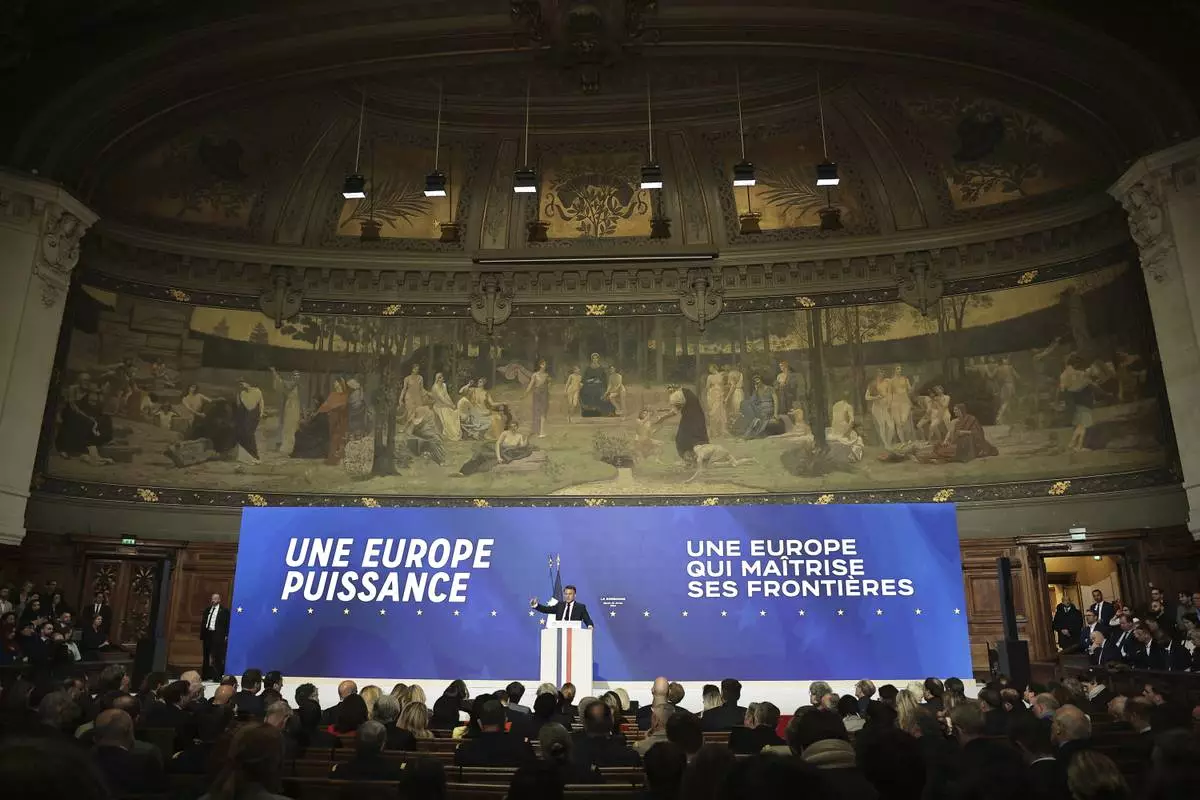
French President Emmanuel Macron delivers a speech on Europe in the amphitheater of the Sorbonne University, Thursday, April 25 in Paris. 2024. French President Emmanuel Macron will outline his vision for Europe as a more assertive global power at the backdrop of war in Ukraine, security, and economic challenges in a speech ahead of pivotal election for the European Parliament in June. (Christophe Petit Tesson, Pool via AP)
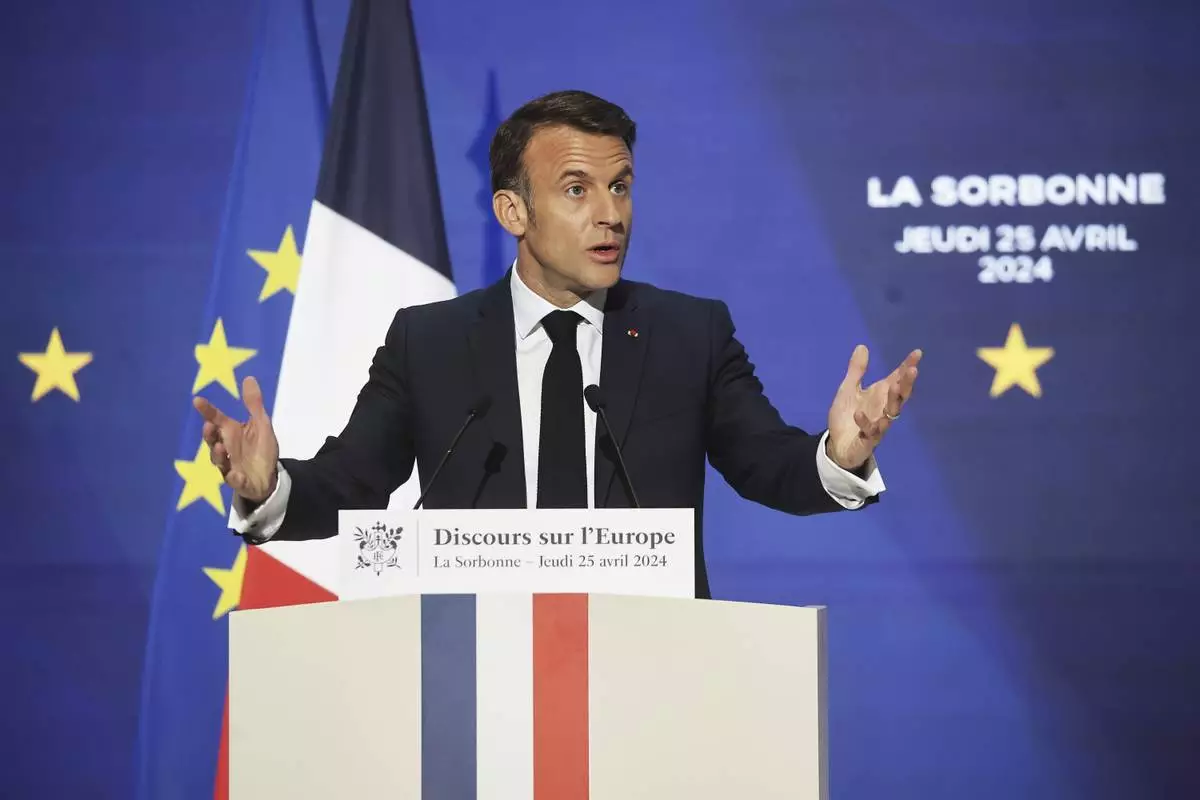
French President Emmanuel Macron delivers a speech on Europe in the amphitheater of the Sorbonne University, Thursday, April 25 in Paris. 2024. French President Emmanuel Macron will outline his vision for Europe as a more assertive global power at the backdrop of war in Ukraine, security, and economic challenges in a speech ahead of pivotal election for the European Parliament in June. (Christophe Petit Tesson, Pool via AP)
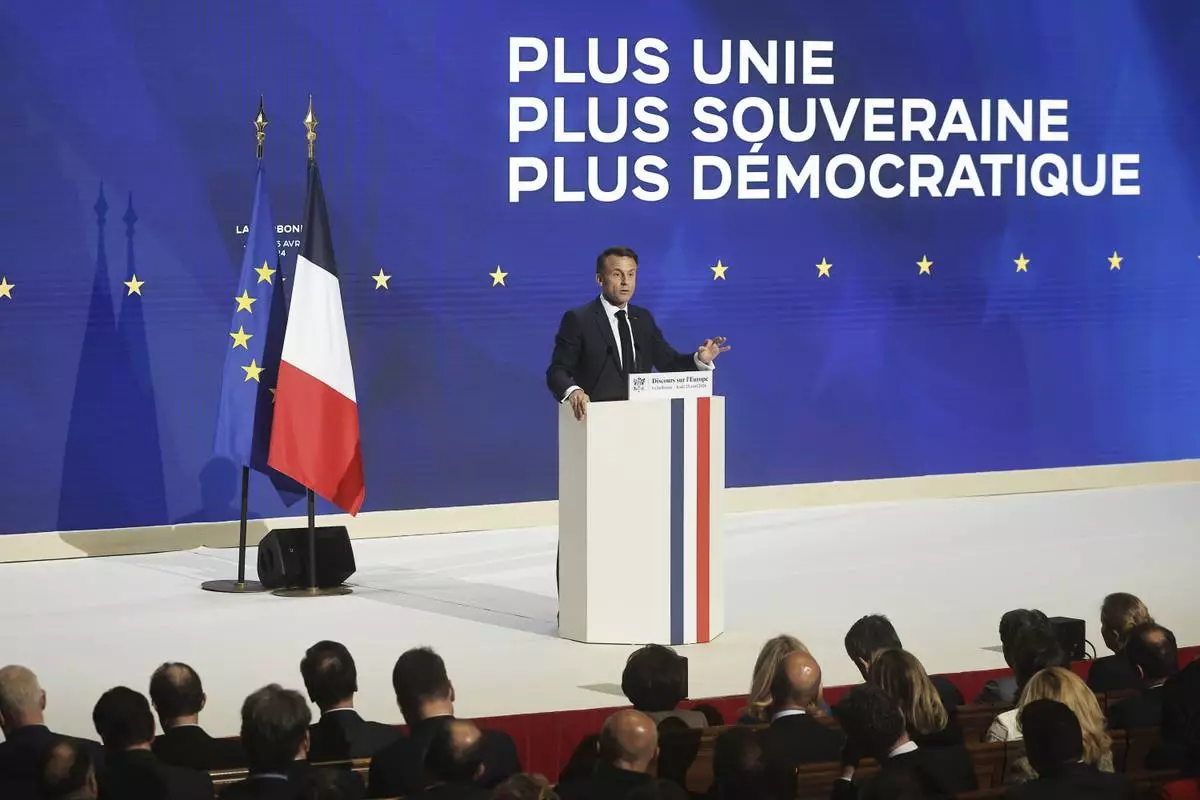
French President Emmanuel Macron delivers a speech on Europe in the amphitheater of the Sorbonne University, Thursday, April 25 in Paris. 2024. French President Emmanuel Macron will outline his vision for Europe as a more assertive global power at the backdrop of war in Ukraine, security, and economic challenges in a speech ahead of pivotal election for the European Parliament in June. (Christophe Petit Tesson, Pool via AP)
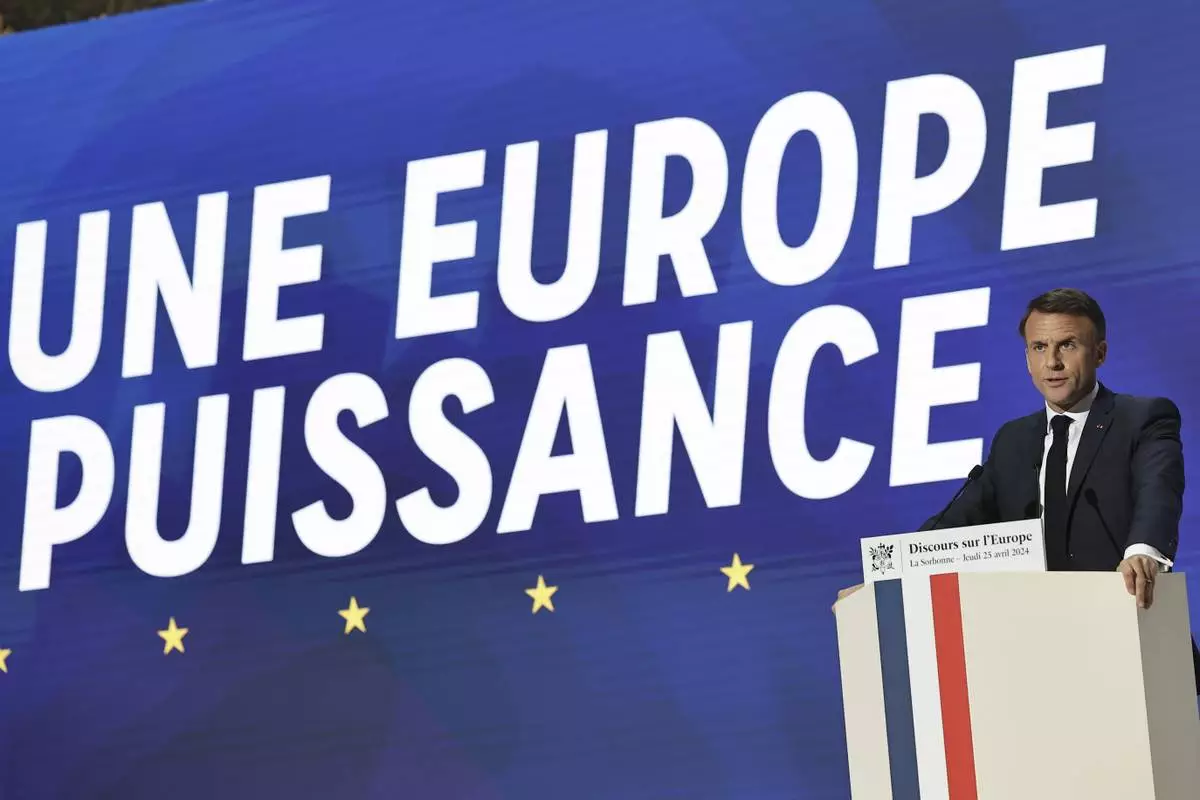
French President Emmanuel Macron delivers a speech on Europe in the amphitheater of the Sorbonne University, Thursday, April 25 in Paris. 2024. French President Emmanuel Macron will outline his vision for Europe as a more assertive global power at the backdrop of war in Ukraine, security, and economic challenges in a speech ahead of pivotal election for the European Parliament in June. (Christophe Petit Tesson, Pool via AP)
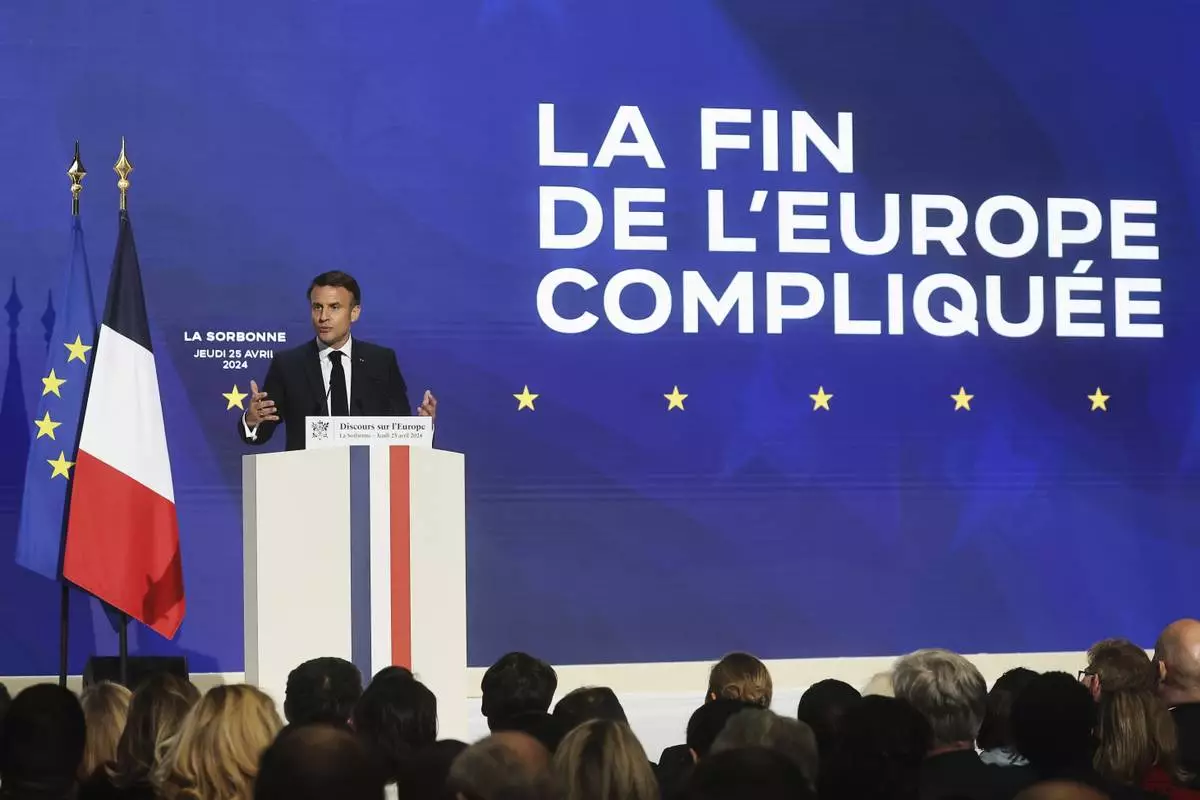
French President Emmanuel Macron delivers a speech on Europe in the amphitheater of the Sorbonne University, Thursday, April 25 in Paris. 2024. French President Emmanuel Macron will outline his vision for Europe as a more assertive global power at the backdrop of war in Ukraine, security, and economic challenges in a speech ahead of pivotal election for the European Parliament in June. (Christophe Petit Tesson, Pool via AP)
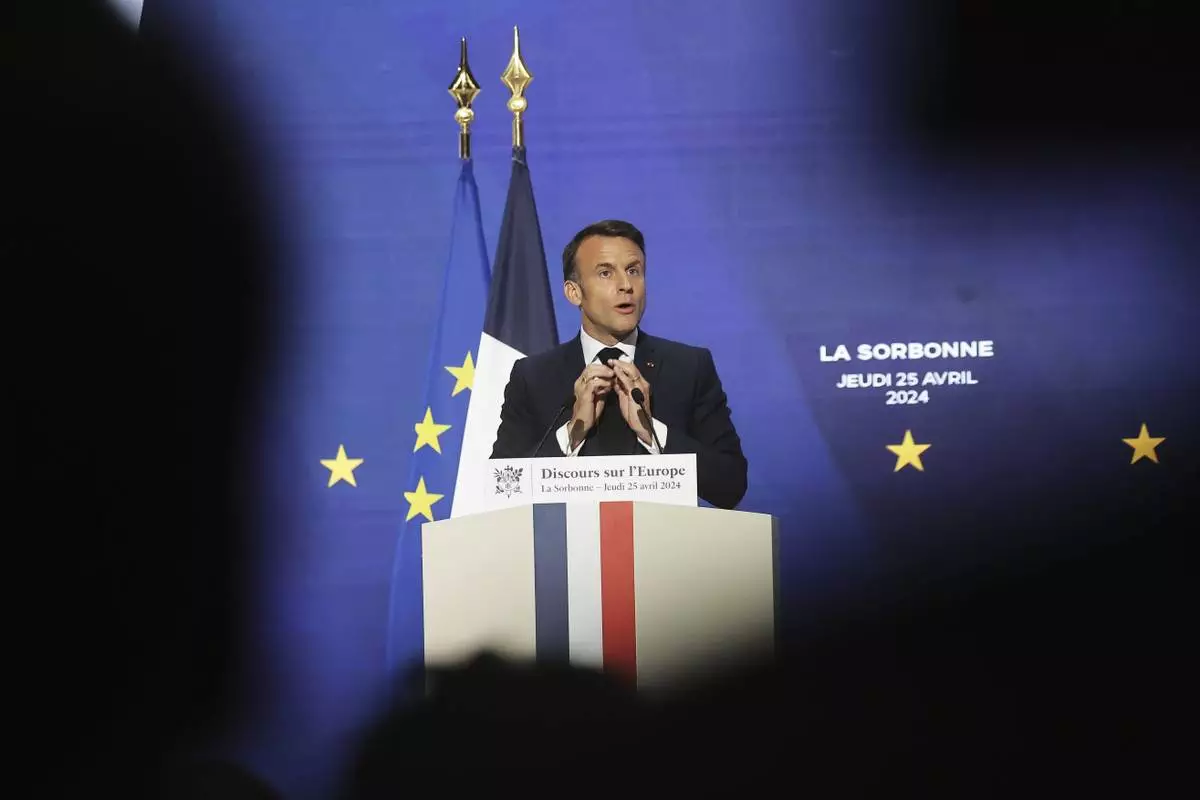
French President Emmanuel Macron delivers a speech on Europe in the amphitheater of the Sorbonne University, Thursday, April 25 in Paris. 2024. French President Emmanuel Macron will outline his vision for Europe as a more assertive global power at the backdrop of war in Ukraine, security, and economic challenges in a speech ahead of pivotal election for the European Parliament in June. (Christophe Petit Tesson, Pool via AP)
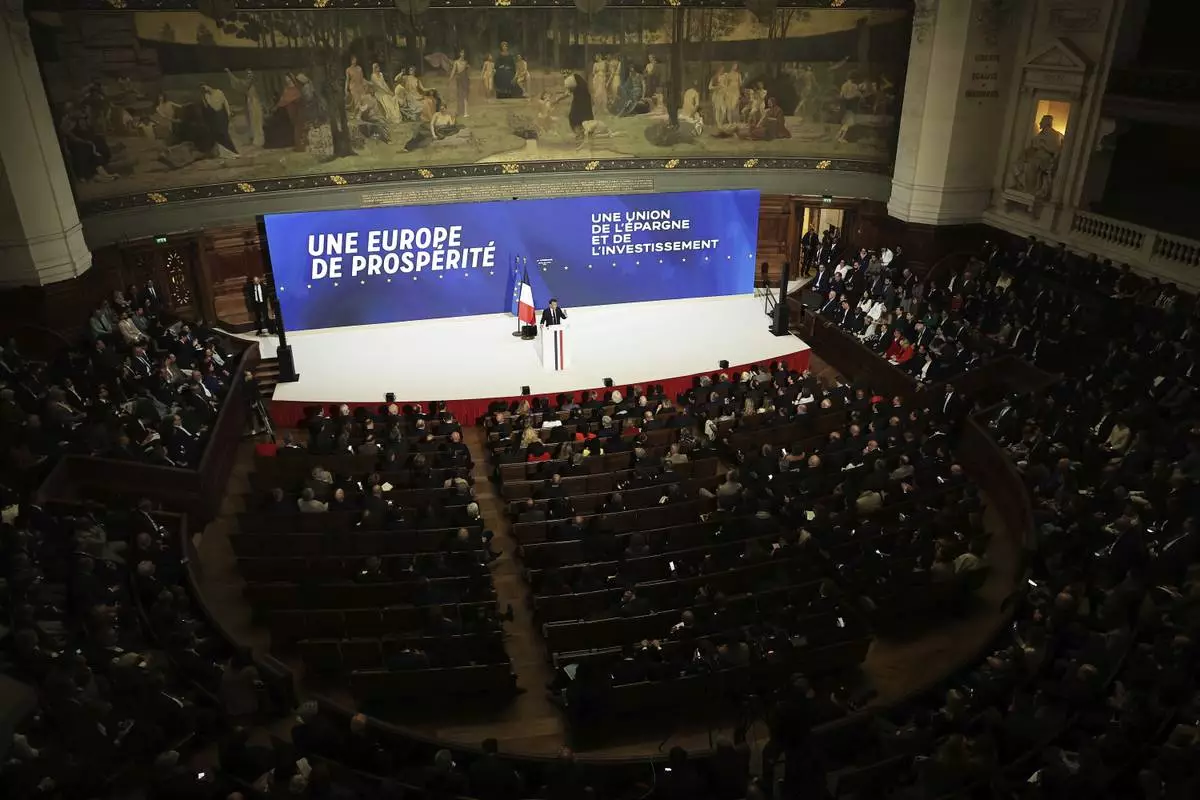
French President Emmanuel Macron delivers a speech on Europe in the amphitheater of the Sorbonne University, Thursday, April 25 in Paris. 2024. French President Emmanuel Macron will outline his vision for Europe as a more assertive global power at the backdrop of war in Ukraine, security, and economic challenges in a speech ahead of pivotal election for the European Parliament in June. (Christophe Petit Tesson, Pool via AP)
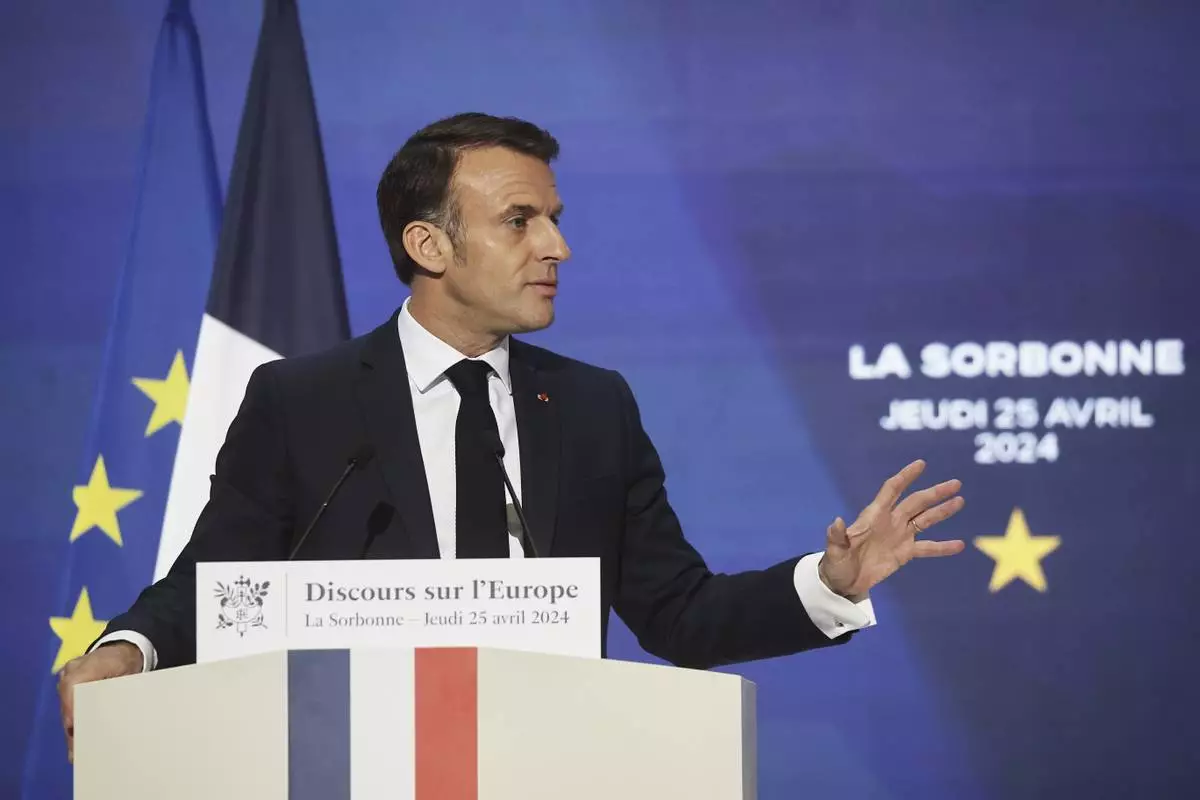
French President Emmanuel Macron delivers a speech on Europe in the amphitheater of the Sorbonne University, Thursday, April 25 in Paris. 2024. French President Emmanuel Macron will outline his vision for Europe as a more assertive global power at the backdrop of war in Ukraine, security, and economic challenges in a speech ahead of pivotal election for the European Parliament in June. (Christophe Petit Tesson, Pool via AP)
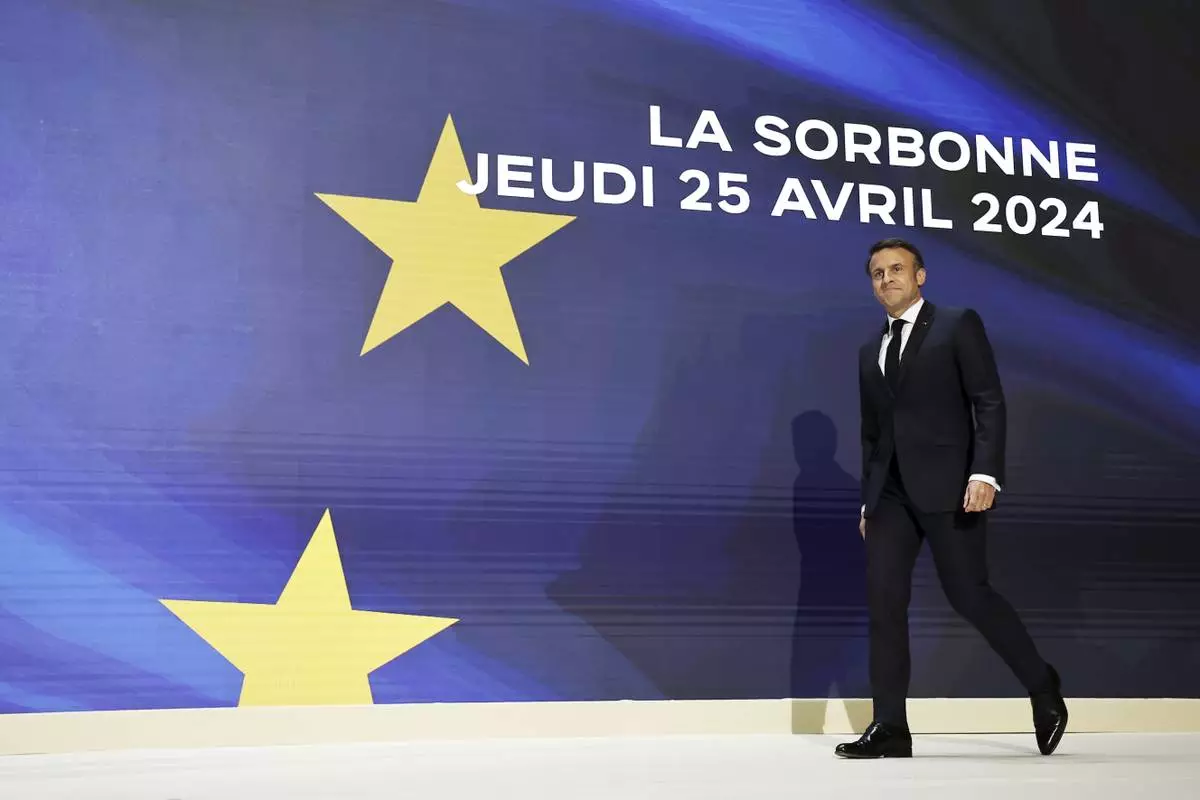
French President Emmanuel Macron arrives to deliver a speech on Europe in the amphitheater of the Sorbonne University, Thursday, April 25 in Paris. 2024. French President Emmanuel Macron will outline his vision for Europe as a more assertive global power at the backdrop of war in Ukraine, security, and economic challenges in a speech ahead of pivotal election for the European Parliament in June. (Christophe Petit Tesson, Pool via AP)
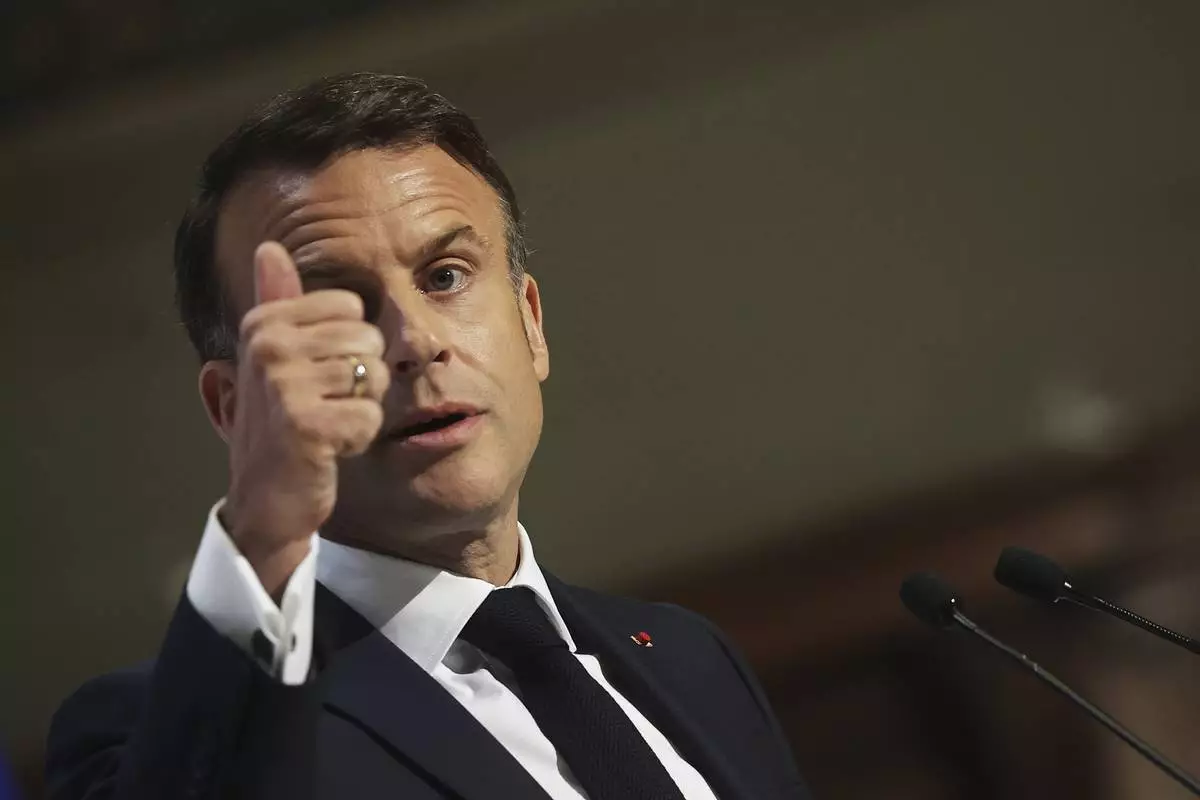
French President Emmanuel Macron delivers a speech on Europe in the amphitheater of the Sorbonne University, Thursday, April 25 in Paris. 2024. French President Emmanuel Macron will outline his vision for Europe as a more assertive global power at the backdrop of war in Ukraine, security, and economic challenges in a speech ahead of pivotal election for the European Parliament in June. (Christophe Petit Tesson, Pool via AP)
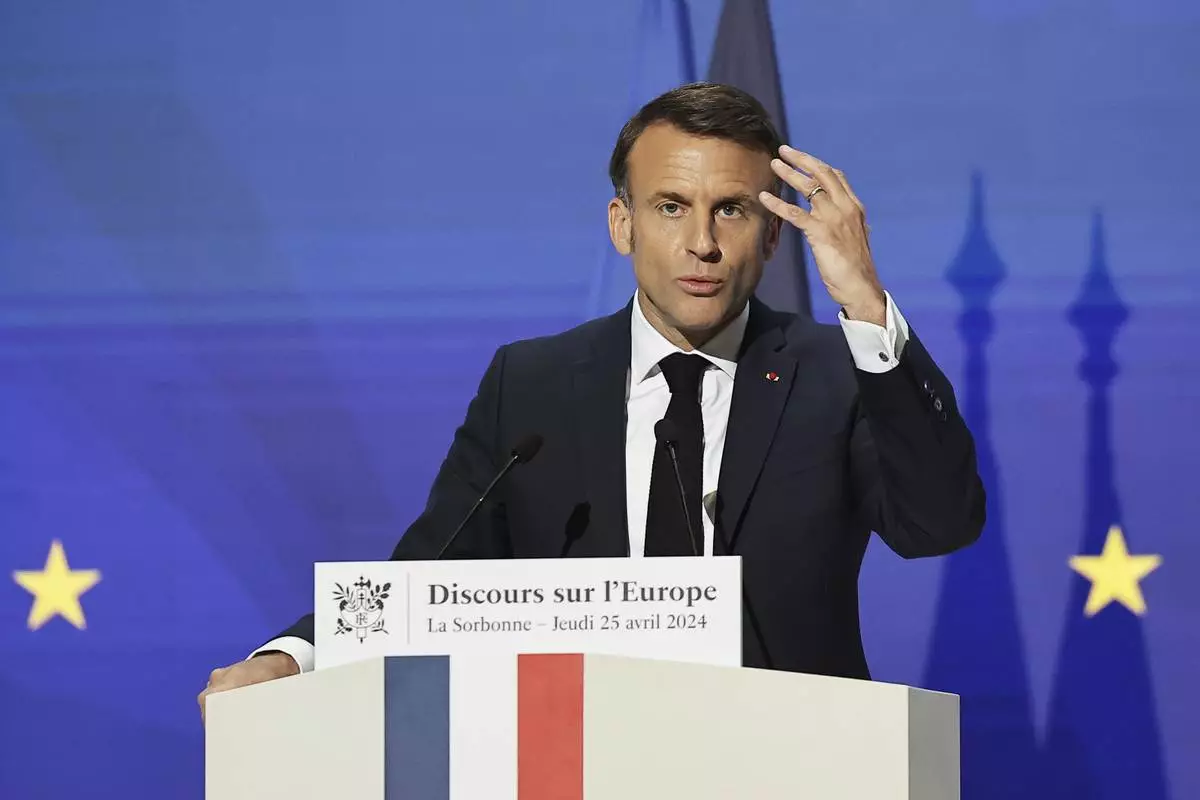
French President Emmanuel Macron delivers a speech on Europe in the amphitheater of the Sorbonne University, Thursday, April 25 in Paris. 2024. French President Emmanuel Macron will outline his vision for Europe as a more assertive global power at the backdrop of war in Ukraine, security, and economic challenges in a speech ahead of pivotal election for the European Parliament in June. (Christophe Petit Tesson, Pool via AP)
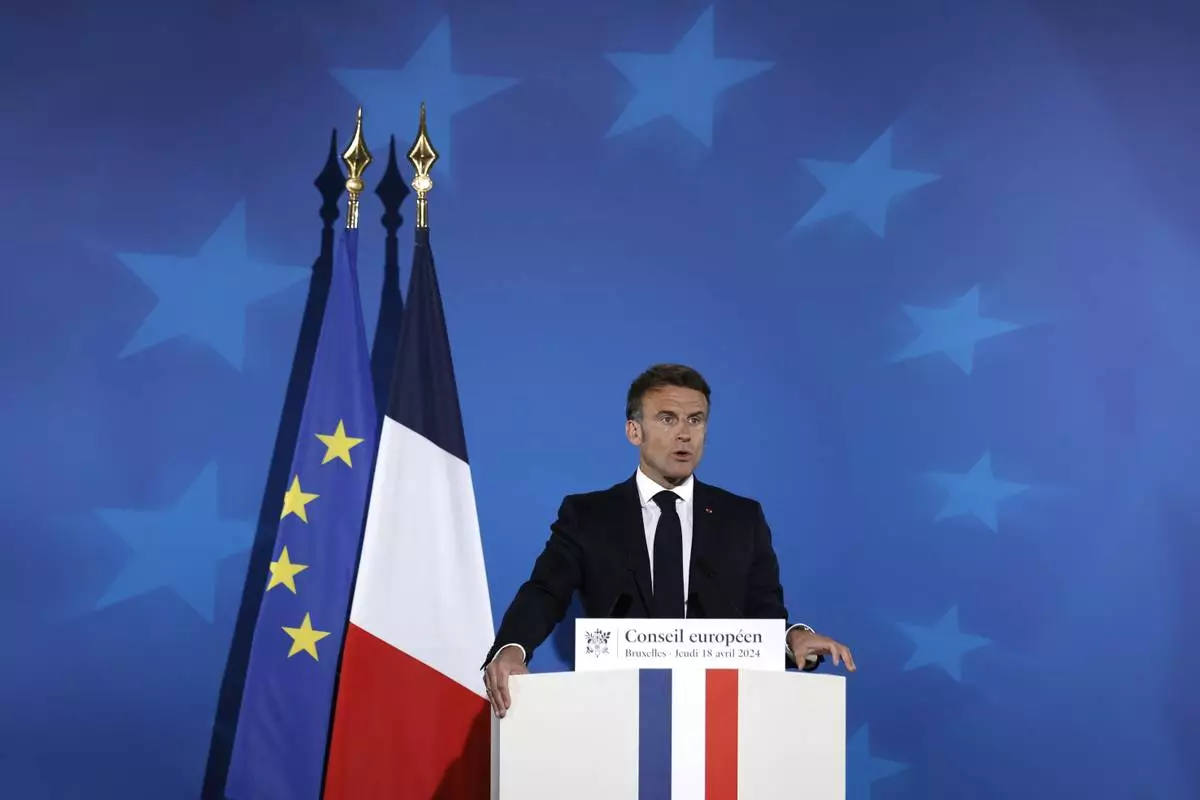
French President Emmanuel Macron speaks during a media conference at an EU summit in Brussels, Thursday, April 18, 2024. European Union leaders on Wednesday debated a new "European Competitiveness Deal" aimed at helping the 27-nation bloc close the gap with Chinese and American rivals amid fears the region's industries will otherwise be left behind for good. (AP Photo/Omar Havana)






















